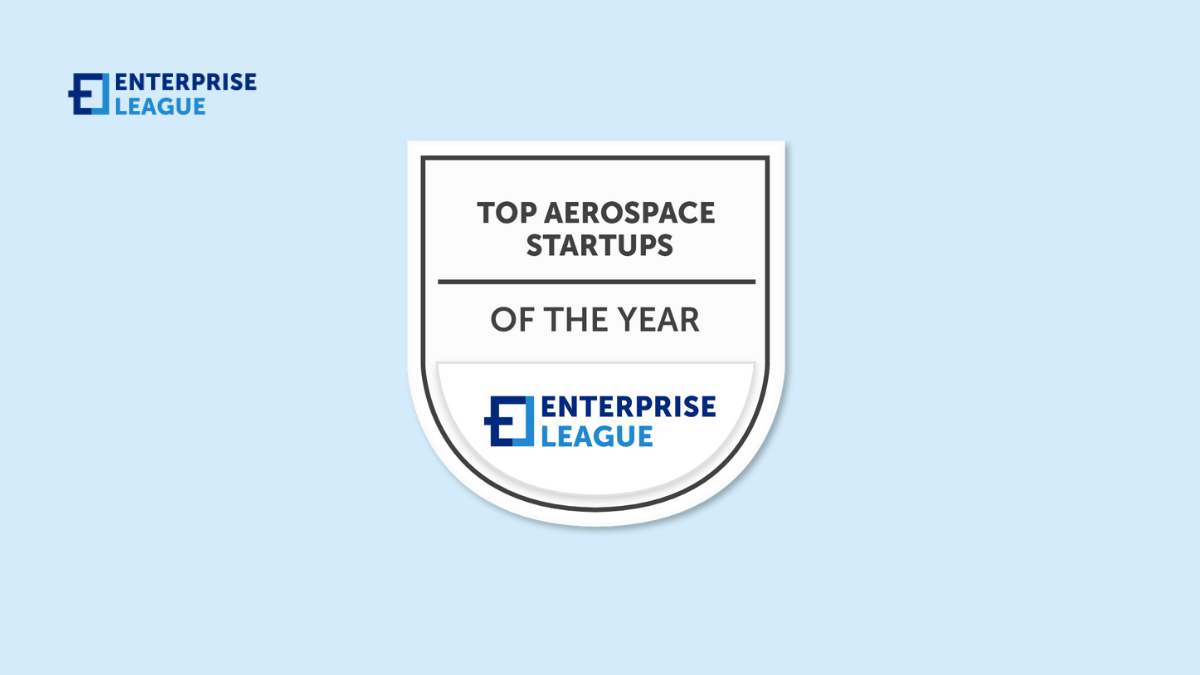Hence, the aerospace industry is experiencing a boom of new technologies – it’s hardly surprising that startups are looking to get in on the action. Inspired by the past and dedicated to solving the challenges of future space exploration, many aerospace startups were born in the past few years, and some of them are really revolutionizing the aerospace industry.
What are aerospace startups?
Aerospace startups are known to be high-flying technologies, although they’re supported by more of a proof-of-concept than a working prototype. Even as they’re getting their enterprises off the ground and out into the stratosphere, investors need to hold onto their seats and strap themselves in.
The most innovative aerospace startups in 2024
D-Orbit
D-Orbit pioneers space logistics capabilities enabling optimized transportation, precision deployment, and end-of-life disposal for satellites in orbit. As the first company tackling the complex needs of managing infrastructure and missions throughout spacecraft lifecycles, D-Orbit offers an integrated solution.
Their ION Satellite Carrier can transport over 80 hosted payloads at a time before releasing each asset at custom destinations. ION handles space debris removal too, capturing retired satellites and controlledly deorbiting them. With the ability to ferry satellites, synchronize multi-payload releases across orbits, and manage space waste, D-Orbit unlocks new economies of scale for the commercial space sector while preventing overcrowding as launch rates accelerate exponentially in coming years.
Anduril Industries
Founded in 2017, Anduril develops intelligent perimeter solutions using autonomous drones, sensors, and modular towers. Their autonomous sentry system is deployed along the southern U.S. border. Features integrate sensor data to identify and track unauthorized crossings in remote areas.
Anduril aims to enhance surveillance capabilities and safety outcomes with automation that amplifies human judgment. Their systems cue video review and mobilize responses based on AI classification. Anduril believes applied properly under oversight, advanced technology can uphold security more humanely and effectively.
Isar Aerospace
Knowing that space flight will shape how humans will live, work and travel tomorrow, with their innovations Isar Aerospace contributes to humanity’s progress and our planet’s sustainable technological and economic development.
Accion Systems
Their innovative propulsion system is suitable for small satellites, constellations, and other mission-critical spacecraft. That means you can extend your mission lifetime without sacrificing the mission, and get more value from every satellite in your fleet.
ClearSpace
In the past, abandoned and damaged satellites in orbit have been manually captured and repaired through astronaut-led missions using the space shuttle, but with ClearSpace shaping the future of the aerospace industry, that will no longer be the case.
AgniKul Cosmos
This vehicle doesn’t fly with the same number of engines all the time but the satellite and the launch port itself would decide how many engines will go on the first stage. Moreover, Agnibaan can access both low and high inclination orbits, is designed for accessing more than 10 launch ports, and is completely mobile.
LeoLabs
With a focus on providing unparalleled support for industries that rely on satellite services, and with their network of ground-based, phased array radars, LeoLabs produces high-resolution data on objects in LEO. They are already shaping the aerospace industry because what once took tracking objects in LEO meant decades and billions of dollars to stand up the required radars, computing infrastructure, and staffing, today is handled by the LeoLabs team.
ABL Space Systems
ABL Space Systems’s team of engineers and builders comes from the world’s leading aerospace and defense companies and their goal is to prove that reaching space can be simple, efficient, and routine. On the whole, this revolutionary aerospace startup changes what it means to launch rockets in the modern space age, in less time than thought possible.
CesiumAstro
Their software-defined communication systems are with full environmental testing, ready to install and fly. All you need to do is define your payload requirements and CesiumAstro will configure a mission-ready solution customized to your application utilizing their full-stack modular product line.
SCOUT
They’ve developed a SCOUT-Vision payload system, that gives spacecraft eyes and enables better navigation and avoiding threats. Moreover, their computer vision and guidance software packages allow a new era of complex autonomy.
Kawa Space
Kawa Space is organizing the world’s satellite data and making it universally queryable, accessible, and instantly useful. This innovative aerospace startup developed the GEOINT platform that enables teams of all sizes to decode their area of interest simply by using an API call.
With a mission to democratize space for all, Kawa Space is building roads so our future generations can go explore the ever-expanding universe. Hence, this is one of the aerospace startups that are forever changing the future of the aerospace industry by harnessing the power of satellites orbiting our planet.
Kayhan Space
The screening process is fast and fully accessible via Kayhan Space’s dashboard as well as APIs. Even though this aerospace startup was launched by a small-but-mighty team thair technological solutions promise rapid growth.
LaunchPoint EPS
Because of their dedication to bringing innovative solutions that will revolutionize the aerospace industry and proven results, LaunchPoint EPS found its place on our list of best aerospace startups in 2022. The team of this aerospace startup is a diverse and experienced group of scientists and engineers that are recognized as world experts in electric propulsion technology.
Coflyt
With this innovative aviation app, you can keep visibility of mechanical issues and squawks at your fingertips, as well as required VFR/IFR inspection statuses, and monitor service intervals like oil changes, etc. You will also be able to log flights made by partners to analyze usage, map flights, and more, and quickly share aircraft information with your A&P, so you can both save time.
FlightLink
This aerospace startup developed the world’s first vetted air pooling platform, which allows members to self-coordinate shared private flights in compliance with aviation regulations. Furthermore, they offer a powerful suite of proprietary benefits for aircraft owners, charter customers, jet card and fractional members, and even commercial flyers interested in more affordable private aviation.
Aeroflux Braking Systems
Aeroflux’s proprietary multi-directional electromagnetic array creates a very specific magnetic field distribution across the disc, therefore it offers superior performance to existing eddy current brakes of equal volume and weight.
Dragonfly Aerospace
They create imager products that can be used in modern CubeSat or microsatellite platforms to create compact high-performance satellite solutions, and they manufacture satellite buses to deliver electro-optical and SAR payloads. With excellent vision, agility, and stability, this aerospace startup is significantly improving the aerospace industry.
Deimos-One
By combining artificial intelligence, autonomous robotics, and machine learning, Deimos-One is redefining what it means to be cutting edge. They are motivated by challenges to solve problems never solved before. And to achieve all that, they have leadership comprised of seasoned veterans and experts from the world’s most renowned aerospace, technology, and data science companies.
ienai SPACE
Thus, they’ve developed the world’s first fully customizable onboard electric propulsion system, based on electrospray technology. That being the case, their thrusters can be tailored to the requirements and constraints of any mission and platform. The end product is uniquely engineered to meet the challenges of pushing your spacecraft further, for longer.
BlackSky Global
This aerospace startup monitors activities and facilities worldwide by harnessing the world’s emerging sensor networks and leveraging its own satellite constellation. Furthermore, BlackSky monitors for pattern-of-life anomalies to produce alerts and enhance situational awareness.
BirdsEyeView Technologies
The traditional crop insurance doesn’t work on-site loss adjustments and risk assessments are an accurate result in valuation disagreements delays and payout and make cover expensive. Fortunately, BirdsEye View’s solution harnesses high-resolution satellite imagery to accurately monitor global weather conditions.
Astranis
Major deals with companies like Rakuten Mobile demonstrate the demand for optimized satellite internet capabilities. As Astranis satellites launch, their model unlocks new economies of scale in space—a vision critical for companies to sustainably meet 21st century bandwidth needs.
DroneUpAstranis
Major partnerships with companies like Walmart, American Robotics, and the Commonwealth of Virginia enable transformative use cases with long-term ROI. As drone technology advances, DroneUp as a unique aerospace startup that provides the essential expertise and infrastructure to drive innovation.
Relativity Space
Relativity already has contracts for launches with Iridium, Telesat, and the US Department of Defense. As their partially 3D printed Terran 1 rocket prepares to debut, Relativity is proving the transformative potential of cutting-edge manufacturing paired with autonomous technologies.
Skydio
Now Skydio is applying their self-flying technology across industries from media to infrastructure. Companies like Apple rely on Skydio drones for 3D mapping work at scale. Skydio also partners with major enterprise UAV distributors.
Kairos Aerospace
With experienced data scientists and FAA approvals to fly at scale, Kairos unlocks the full potential of commercial drones. Their platform demonstrates how airborne data ecosystems generate tangible benefits across the public and private sectors when contextually delivered.
Boom Supersonic
With historic commercial supersonic flights halted since 2003, Boom is resurrecting the capability sustainably.
DJI
With laser focus on end-user experience, DJI makes drone technology accessible, safe and easy to use. Their ongoing innovation across hardware and software cements dominance in consumer drones while expanding in the commercial sector.
Planet
Planet’s imagery offers an unprecedented window into humanity’s changing relationship with nature. As climate threats accelerate, their technology enables near real-time monitoring to support sustainability.
Axiom Space
Partners including SpaceX, Boeing and Thales Alenia Space enable Axiom to leverage proven systems for commercial space station innovation. Their development expands humanity’s presence in space for decades to come.
Volocopter
Major commercial launch contracts with partners like Geely in China reinforce confidence in Volocopter air taxis soon offering a new dimension to mobility.
What all these aerospace startups have in common
Discover more creative startups that might interest you:
- Top real estate startups that are changing the real estate industry.
- Creative renewable energy startups that are on a mission to cleaner Earth.
- Must-know NFT startups that are on the forefront of this new industry.
- Must-know hvac manufacturing startups that redefine the industry norms.
- Innovative mental health startups with tremendous potential in near future.
Related Articles
Scaling your data annotation efforts: A guide to efficient labeling
This guide highlights the critical role of a thought-out data labeling strategy, digs into workflow optimization and presents actionable steps for scaling up.
Top 26 sheet metal companies paving the way forward (2024)
The top 26 sheet metal companies with the smartest techniques of sheet metal fabrication. Find out what technologies they use and how are they shaping the path forward.
8 essential skills you need to run a successful business
We will go through the eight critical skills that entrepreneurs and business leaders need to master to establish flourishing and enduring businesses.
Scaling your data annotation efforts: A guide to efficient labeling
This guide highlights the critical role of a thought-out data labeling strategy, digs into workflow optimization and presents actionable steps for scaling up.
Top 26 sheet metal companies paving the way forward (2024)
The top 26 sheet metal companies with the smartest techniques of sheet metal fabrication. Find out what technologies they use and how are they shaping the path forward.








